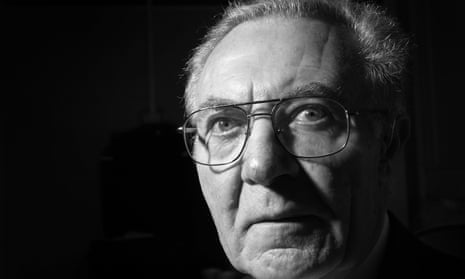Mayer Hersh, who has died aged 90, became in the last 30 years of his life one of the foremost UK-based witnesses to the Holocaust. That he had lived to tell his story at all was little short of miraculous. Hersh, whose family name was originally Herszkowicz, was a Polish Jew, born in the town of Sieradz, near Łódź, in central Poland. His father, Isaac, who was a tailor, mother, Riwka (nee Szczukowska), and four of his siblings were murdered in the Holocaust, as were his entire extended family in Poland, numbering close to a hundred. Only Mayer and his elder brother, Jakob, survived, taken from Sieradz in 1940 to be slave labourers.
The brothers were separated and Mayer, who was 13 at the outbreak of the second world war, was taken from camp to camp. In May 1943 he found himself in Auschwitz. A few months later, he met Jakob in the camp and advised him to ask for a transfer to the coalmines in Silesia – advice that probably saved Jakob’s life, since, though the job was desperately hard, it took him out of the camp.
Mayer did not leave Auschwitz until November 1944, when he was taken to Stutthof, near the Baltic Sea, then to Stuttgart, and then to a camp called Gotha, where he worked in an underground bunker loading ammunition on to trucks. The day before the allies arrived, the workers began a forced march to Buchenwald, the last part of it through the mountains. “Anyone who stopped got a single bullet through the head,” said Hersh. “They didn’t waste a bullet. For the first time, I had lost all hope. I was in total despair, but the man next to me, a complete stranger, said: ‘You can’t give up now, the war is virtually finished.’ That made me carry on.”
After liberation, Hersh came to Britain with a Jewish refugee group and lived initially in the Lake District, where 300 young survivors of the camps were taken to recuperate. “For the first time in five years we were treated with dignity and respect,” he said, “and this by local people who didn’t really know who we were.”
Jakob, meanwhile, went initially to the US and then settled in Israel. The brothers remained close, and Mayer was a frequent visitor to Israel until Jakob’s death in 2003.
Mayer had grown up in a Yiddish-speaking household, and also spoke Polish and German, but now had to learn English. A gifted linguist, he picked it up quickly, settled in Manchester, home to a large Jewish community, trained as a tailor and built a successful bespoke business.
He had a shop in central Manchester, was active on behalf of Jewish causes – looking after survivors and collecting money for the new state of Israel – and in 1965 married Judith Cooklin, whom he had met at a Jewish social club in the city. Like almost all Holocaust survivors, in the 1950s and 60s he said little publicly of his experiences in the war. A combination of survivor guilt and the fact that the community in which he now lived had itself been traumatised by the war and wanted to resume normal life meant that much was left unsaid. But from the 70s on, and especially once he had retired, Hersh became an increasingly significant voice in Holocaust education.
He toured schools – sometimes up to three a week – giving talks on his experiences, and his friend David Arnold, who helped plan the visits, says he may have addressed 100,000 schoolchildren. Many corresponded with him after his visits, and some became lifelong friends.
As a survivor of nine camps, Hersh was much in demand to verify archival material, and recorded his testimony many times, most notably in 1997 for the University of Southern California Shoah Foundation, established by the film director Steven Spielberg in 1994. In 2003 Hersh cooperated with the author Colin Rushton on a book called Beyond the Gates of Hell. Arnold is also preparing a book, based on conversations with Hersh, called Of Hell and Humanity.
Hersh’s educational work was recognised with his appointment as MBE in 2013, but an award that meant even more to him had come the previous year – an honorary doctorate of education from Edge Hill University. He had had a close relationship with Edge Hill, based in Ormskirk, Lancashire, over many years, giving advice to trainee teachers on how to discuss the Holocaust with young people.
Bearing witness – not with anger but with compassion – had become his vocation. “In spite of what he had been through,” said Rabbi Jonathan Guttentag at Hersh’s funeral, “he was not bitter or negative – he was positive and faith-filled; he was wise, he was inspirational … By constantly being prepared to tell the story of his experiences, he was upholding the memory and the dignity of his family, his friends, his community and his people.”
I met Hersh in 2005 for an article to mark the 60th anniversary of the liberation of Auschwitz. “In 1944,” he told me, “I was daydreaming – when I had a chance to daydream – that maybe I’ll get through and survive, knowing by that time that not many people would. I thought how wonderful it would be if I do survive, how people will put me on a pedestal. You know how the childish mind works. Well, I am on a pedestal, I am given certain honours, you come to interview me. To me, this is a fulfilment.
“But why is it a fulfilment? Because I’m talking about my family, whose lives were extinguished and whose voices were obliterated. The perpetrators also wanted the memory of these people to be obliterated, and that’s something I don’t want to happen. I want their memory to be preserved for eternity.”
Hersh is survived by Judith.
